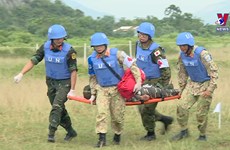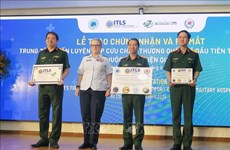WHO warns second wave of A/H1N1 flu outbreaks
The World Health Organisation (WHO) is
advising countries in the northern hemisphere to prepare for a second
wave of pandemic spread as the A/H1N1 virus is now the dominant
influenza strain.
The World Health Organisation (WHO) is
advising countries in the northern hemisphere to prepare for a second
wave of pandemic spread as the A/H1N1 virus is now the dominant
influenza strain.
In a report released on Aug. 28, WHO said evidence from multiple outbreak sites demonstrates that the H1N1 pandemic virus has rapidly established itself and is now the dominant influenza strain in most parts of the world. The pandemic will persist in the coming months as the virus continues to move through susceptible populations.
WHO said clinicians from around the world are reporting a very severe form of disease, also in young and otherwise healthy people, which is rarely seen during seasonal influenza infections.
In these patients, the virus directly infects their lung, causing severe respiratory failure. Saving these lives depends on highly specialised and demanding care in intensive care units, usually with long and costly stays.
According to WHO, a number of countries report that nearly 15 percent of hospitalised cases have required intensive care. During the winter season in the southern hemisphere, several countries have viewed the need for intensive care as the greatest burden on health services.
Preparedness measures need to anticipate this increased demand on intensive care units, which could be overwhelmed by a sudden surge in the number of severe cases.
WHO’s statistics show that since the deadly virus was first found last April, it has infected 209,438 people, of whom at least 2,185 died of the disease.
On August 29, Vietnamese health officials confirmed 157 more cases of A/H1N1 influenza, bringing the country’s total number to 2,569 with two deaths.
Of the newly-detected cases, 109 patients are in the south, nine in the north and 39 others in the central region, reported the Department of Preventive Medicine and Environment under the Ministry of Health.
The department said 1,298 patients have been discharged from hospitals, while the remaining 1,269 have been isolated for treatment.
In the coming time, the ministry will inspect 32 healthcare establishments which will be permitted to conduct A/H1N1 tests for local people if they prove to meet requirements./.
In a report released on Aug. 28, WHO said evidence from multiple outbreak sites demonstrates that the H1N1 pandemic virus has rapidly established itself and is now the dominant influenza strain in most parts of the world. The pandemic will persist in the coming months as the virus continues to move through susceptible populations.
WHO said clinicians from around the world are reporting a very severe form of disease, also in young and otherwise healthy people, which is rarely seen during seasonal influenza infections.
In these patients, the virus directly infects their lung, causing severe respiratory failure. Saving these lives depends on highly specialised and demanding care in intensive care units, usually with long and costly stays.
According to WHO, a number of countries report that nearly 15 percent of hospitalised cases have required intensive care. During the winter season in the southern hemisphere, several countries have viewed the need for intensive care as the greatest burden on health services.
Preparedness measures need to anticipate this increased demand on intensive care units, which could be overwhelmed by a sudden surge in the number of severe cases.
WHO’s statistics show that since the deadly virus was first found last April, it has infected 209,438 people, of whom at least 2,185 died of the disease.
On August 29, Vietnamese health officials confirmed 157 more cases of A/H1N1 influenza, bringing the country’s total number to 2,569 with two deaths.
Of the newly-detected cases, 109 patients are in the south, nine in the north and 39 others in the central region, reported the Department of Preventive Medicine and Environment under the Ministry of Health.
The department said 1,298 patients have been discharged from hospitals, while the remaining 1,269 have been isolated for treatment.
In the coming time, the ministry will inspect 32 healthcare establishments which will be permitted to conduct A/H1N1 tests for local people if they prove to meet requirements./.













